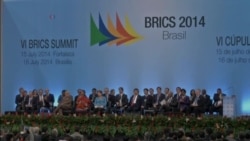When news broke last month that the so-called "BRICS" nations - Brazil, Russia, India, China and South Africa - had agreed to form their own development bank, some analysts feared the new body would be little more than a political bloc. But others are welcoming the plan, saying the world needs help when it comes to development finance.
Leaders of the BRICS nations meeting in Brazil last month reached an important agreement: They would create a development bank to counter the West’s dominance in international finance.
Brazilian president Dilma Rousseff:
“The new BRICS development bank should have an initial authorized capital of $100 billion dollars. And an initial subscribed capital of $50 billion dollars equally distributed between its founding members, the five BRICS countries,” said Rousseff.
Some analysts worried - since international finance has long been the territory of established institutions like the World Bank and the International Monetary Fund, founded and run by Western nations.
Curtis Chin, who served as U.S. ambassador to the Asian Development Bank, said there is little to be concerned about.
“There's always uncertainty and a little bit of fear of what is to come, but what I tell people is, don't be afraid of this uncertain future; we need to embrace it,” says Chin.
Uri Dadush, who tracks the world economy at the Carnegie Endowment for International Peace, agrees.
“The world needs more development finance, particularly in the area of infrastructure. I like the idea of having more competition, competition not just in the private sector but competition among public institutions so long as it’s constructive and complementary,” says he.
But Dadush warns the new bank’s leadership will need discipline.
“It needs to have very strong technical skills in the specific areas of focus. It also needs to understand how to operate in developing countries, which are a very challenging environment. It's one of the reasons that the IMF and the World Bank have such advanced safeguards," says Dadush.
Curtis Chin believes that a BRICS bank will also help its founding countries to discover things about themselves.
“I believe that the BRICS nations will find that the solution to their economic growth is not necessarily one more institution like BRICS Bank, but it will be getting a handle on what I call the 'little BRIC' - that bureaucracy, that regulation, that intervention, that corruption, that sectarianism that is holding back countries from Burma to the BRICS members themselves,” says Chin.
The bank's presidency will rotate, with India going first. The bank itself will be located in Shanghai. But experts say it will be a while before that first bank loan is made.





